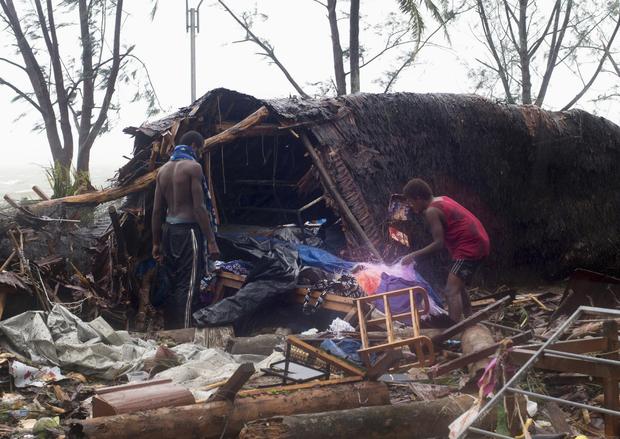Aid workers: At least 8 people dead in Vanuatu cyclone
CHRISTCHURCH, New Zealand -- At least eight people were confirmed dead in Vanuatu after a massive cyclone tore through the tiny South Pacific archipelago, and the death toll is likely to rise much higher once communications are restored with outlying islands, aid workers said Sunday.
Packing winds of 168 miles per hour, Cyclone Pam tore through Vanuatu early Saturday, leaving a trail of destruction and unconfirmed reports of dozens of deaths.
"It felt like the world was coming to an end," Alice Clements, Communications Specialist for UNICEF Pacific, told CBS News. "The winds were incredibly strong, uplifting roofs, destroying infrastructure like hospitals and schools, obviously affecting housing and we suspect causing significant casualties as well."
Chloe Morrison, a World Vision emergency communications officer in Port Vila, said officials from Vanuatu's National Disaster Management Office confirmed to her agency that at least eight people in and around the capital, Port Vila, died.
Officials have yet to assess the damage in many of the hard-hit outer islands because communications and power remain cut, she said. Morrison said she had heard reports of entire villages being destroyed in more remote areas.
A westward change of course put populated areas directly in the path of Pam. The U.N. Office for the Coordination of Humanitarian Affairs said there were unconfirmed reports of an additional 44 deaths in Vanuatu's northeastern islands after Pam moved off its expected track.
Morrison said residents were awakening to much calmer weather Sunday after many hunkered down in emergency shelters for a second straight night. Many people who have ventured out from 23 emergency shelters around Port Vila have found their homes damaged or blown away altogether.
Morrison said communications have been so problematic that her aid group hasn't yet been able to account for many of its own 76 staff members on the islands.
For anybody who wasn't in a secure shelter during the cyclone "it would have been a very, very tough time for them," she said.
Vanuatu has a population of 267,000 spread over 65 islands. About 47,000 people live in the capital, where the U.N. estimated 90 percent of the homes were damaged.
Teetering trees and downed power lines have made parts of Port Vila hazardous.
UNICEF estimated that 54,000 children were among those affected by the cyclone.
U.N. Secretary General Ban Ki-moon said the impact and scope of the disaster caused by the cyclone wasn't yet clear, but he feared the damage and destruction could be widespread.
"We hope the loss of life will be minimal," Ban said at the World Conference on Disaster Risk and Reduction in Japan. The U.N. said it was preparing to deploy emergency rapid response units.
The president of Vanuatu, Baldwin Lonsdale, who was attending the conference, told participants, "I do not really know what impact the cyclone has had on Vanuatu."
"I am speaking to you today with a heart that is so heavy," he said. "I stand to appeal on behalf of the government and the people to give a helping hand in this disaster."
Morrison said the first priority was to ensure people had adequate food, drinking water and shelter. Beyond that, she said, there would need to be a long and concerted rebuilding effort in the months ahead.
She said the winds peaked between about midnight Friday and 1 a.m. Saturday.
New Zealand on Saturday pledged 1 million New Zealand dollars ($734,000) to help with relief efforts. Australia was preparing to send a crisis response team to Vanuatu if needed, Australian Foreign Minister Julie Bishop said.
"There are destructive winds, rain, flooding, landslides, sea surges and very rough seas and the storm is exceedingly destructive there," she said. "We are still assessing the situation, but we stand ready to assist."
The small island nation, located about a quarter of the way from Australia to Hawaii, has repeatedly warned it is already suffering devastating effects from climate change with the island's coastal areas being washed away, forcing resettlement to higher ground and smaller yields on traditional crops.
Scientists say it's impossible to attribute single weather events like Cyclone Pam to climate change.
The cyclone has already caused damage to other Pacific islands, including Kiribati and the Solomon Islands. Authorities in New Zealand are preparing for Cyclone Pam, which is forecast to pass north of the country on Sunday and Monday.
